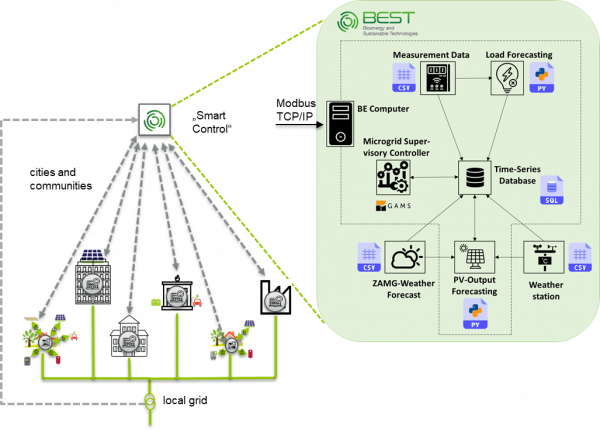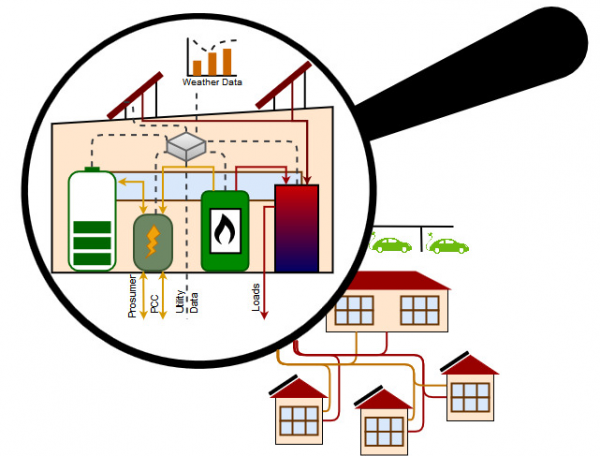SmartControl - Standardized and smart control of municipal energy systems
Short Description
Motivation and research question, Initial situation/status quo
Renewable and decentralized energy is a major solution to achieve Austrian climate and energy objectives (#mission2030). Local energy communities show high potential for the efficient use of distributed energy technologies, including volatile energy production from renewable resources. Costs and CO2 can be reduced by up to 17.6% and 37.2%, respectively [Stadler_2013]. Therefore, community energy systems are also pushed by policy makers (Erneuerbare Ausbaugesetz-EAG). There were only limited possibilities to bring local energy communities into reality at the start of the project in the springtime 2021. Meanwhile a legal framework for renewable energy communities in Austria was published in ELWOG. Furthermore, uniform, standardized procedures for the collection of load and generation data (e.g. smart meters, PV, storage systems, etc.) in municipalities, communities or neighborhoods are missing. Furthermore, realtime data collection, if at all, rarely takes place. Moreover, an intelligent higher-level control system communicating with individual technologies is essential for an optimal, resilient operation of energy communities. Currently, technology manufacturers use different communication interfaces. This increases the effort required to develop a universally applicable higher-level control algorithm that can be installed without great effort and cost.
Project contents and objectives
The aim of this development was a cost-effective "plug and play" solution for the regulation of renewable energy communities, which can be applied at different hierarchy levels. These new developments were integrated and tested in the smart- and microgrid control algorithm. Furthermore, control strategies were investigated in order to further increase the self-utilisation of renewable energy produced within renewable energy communities. This can significantly reduce costs and CO2 emissions. In addition, the developed concepts can increase security of supply.
Methodical procedure
Open standards and open source solutions were used. The software gateway for data-acquisition was built upon openHAB, an open source platform for data communication in energy systems. For the development of forecasting algorithms different methods of artificial intelligence were used and tested. Two municipalities of different sizes, an energy supplier and a grid operator were involved during all development steps in order to take their perspectives and demands into account. In both municipalities, Wieselburg and Yspertal, measurement technology was installed to collect data on energy consumption and energy production for representative use cases.
Results and conclusions
The result of this project was a hardware and software gateway for communication between the end application and the energy management system. In addition to the further development of the hardware, a REST API interface was set up. To enable coupling between the HABWerk gateway and the smart and microgrid controller from BEST a python module was developed. With this overall hard and software package, nodes in an energy system can be connected to an energy management system down to the level of individual households. In addition, new forecasting methods based on machine learning algorithms have been developed. Hence the forecasting tool adapt to the respective environment in a self-learning manner without the need for costly calibration measures.
Outlook
This project covered current research and development topics in the energy industry. Both, the lack of standards for real-time data communication in energy communities and the issue of forecasting are attracting great attention from research and energy providers. These topics are highly relevant not only in terms of the market economy but for achieving climate-neutral energy systems. BEST and wüsterstrom are already working on a joint follow-up project, RISE - Reinforcement Learning for Intelligent and Resilient Energy Communities. The project RISE deals with the application of machine learning algorithms in energy management systems for small energy systems in order to make them more robust against forecast uncertainties. The development of HABWerk technology is being continuously driven forward by wüsterstrom and is also being used in projects with BEST.
Project Partners
Project management
BEST - Bioenergy and Sustainable Technologies GmbH
Project or cooperation partners
- municipality Yspertal
- municipality Wieselburg
- Wüsterstrom E-Werk GmbH
Supporting Partners
- University of California - San Diego, Prof. Jan Kleissl, Director of UCSD Center for Energy Research
- Innovationslabor act4.energy
Contact Address
BEST - Bioenergy and Sustainable Technologies GmbH
Stefan Aigenbauer
Gewerbepark Haag 3
A-3250 Wieselburg-Land
Tel.: +43 (5) 02378-9447
E-Mail: stefan.aigenbauer@best-research.eu
Web: www.best-research.eu


